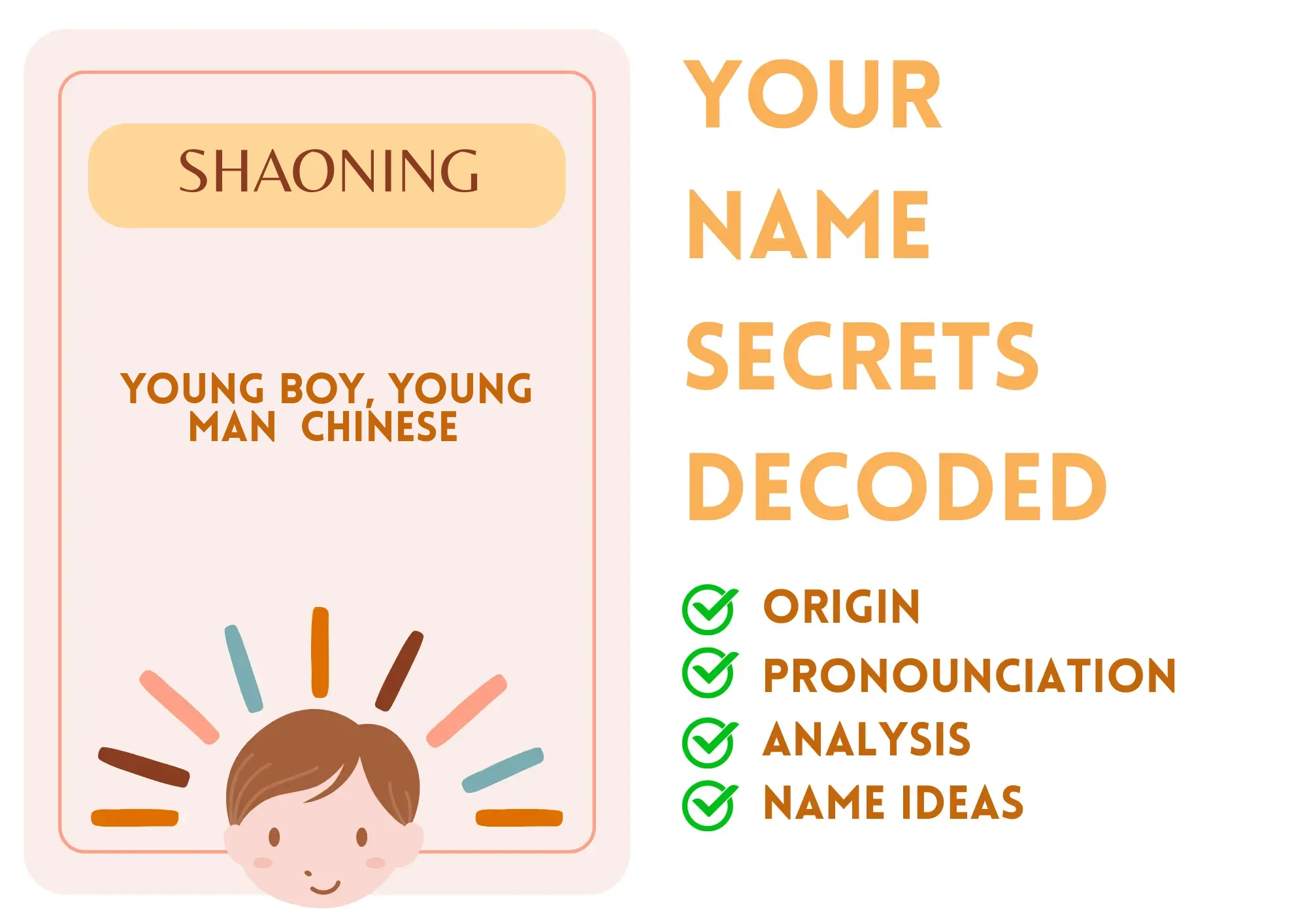
Shaoning
Shaoning is a name with roots in Chinese culture, commonly manifesting as both a first name and a surname. In Chinese, 'Shaoning' can mean 'young boy' or 'young man,' reflecting youth and vitality. Though it is primarily used as a masculine name, it can occasionally be used for unisex purposes.
In Chinese culture, names often carry significant weight, and Shaoning’s connotation of youthfulness and strength makes it a favorable choice among parents. It is generally perceived positively and associated with the vigor and promise of youth.
Shaoning is relatively easy to write and pronounce for speakers familiar with Mandarin, though it may present a challenge for those unfamiliar with Chinese phonetics. Common nicknames include Shao and Ning, contributing to its informal charm.
Basic Information
Gender: Boy
Sounds Like: SHAO-ning
Pronunciation Explanation: The first syllable is pronounced like 'shao' (rhymes with 'how'), followed by a softer 'ning' (like 'sing').
Summary and Meaning
Meaning: young boy, young man (Chinese)
Origin: Shaoning has Chinese origins, often found in Mandarin-speaking areas and among those of Chinese descent.
Usage: Shaoning is traditionally viewed as a masculine name, embodying ideals of youthfulness and strength.
Name Number (Chaldean)
Name Number (Pythagorean)
Popularity (Global Rank)
Overall: 326486
Boys:
Most Popular in
Religious and Cultural Significance
Religion: Buddhism
Background: In a broader sense, Chinese names, including Shaoning, are often influenced by various philosophies, including Buddhism, which values youth, learning, and growth.
Cultural Significance: The name Shaoning resonates within families that wish to express aspirations for vitality and potential in their sons. It combines traditional values with a modern recognition of youth.
Historical Significance: Names like Shaoning have been prevalent in Chinese history, often embodying the qualities admired in the youth of a family. It reflects the societal appreciation of the next generation's potential.
Popular Culture
Literature and Mythology: Shaoning may not be widely referenced in historical texts, but youth is a common theme in many Chinese stories and legends, often celebrating the vitality of young protagonists.
Movies and Television: Characters named Shaoning or possessing similar traits may appear in various Chinese films and series, usually symbolizing youth, optimism, and a bright future.
Feelings and Perceptions
Perception: Shaoning is generally viewed positively, evoking feelings of vitality, hope, and a connection to youth and potential.
Positive Feelings: Energetic, youthful, optimistic, cultural resonance.
Negative Feelings: Might be difficult to pronounce for non-native speakers.
Practical Considerations
Ease of Writing and Calling: The name Shaoning is moderately straightforward to write, especially for those familiar with Mandarin. It consists of two syllables, though the pronunciation may pose a challenge for non-Mandarin speakers.
Common Typos and Misspellings: Shaoningh,Shaonning,Shaonig,Shaoneng
Common Nicknames: Shao,Ning,Sha
Shaoning Popularity
Shaoning Usage and Popularity By Country
| Country | Rank (Overall) |
|---|---|
| Ireland | 23749 |
| New Zealand | 33723 |
| Singapore | 53638 |
| Canada | 61528 |
| Italy | 69345 |
| Netherlands | 70785 |
| Germany | 81441 |
| Australia | 105589 |
| United States | 186323 |
Shaoning Usage and Popularity By City
| City | Rank (Overall) |
|---|
Compatibility Analysis
Famous Persons Named Shaoning
No results found for Shaoning.
Related Names
Similar Sounding Names:
Shan,Shanling,Xiaoming,Shang